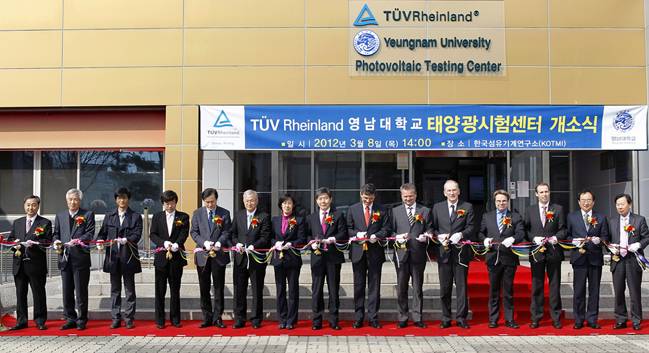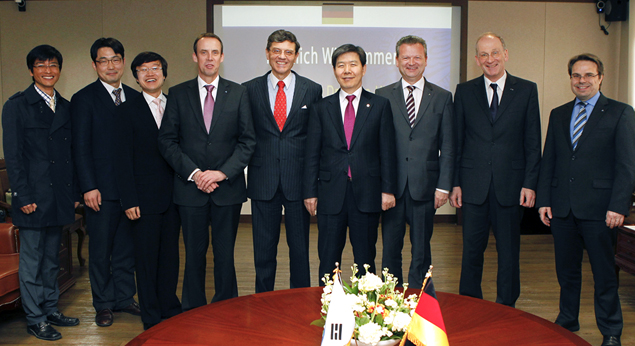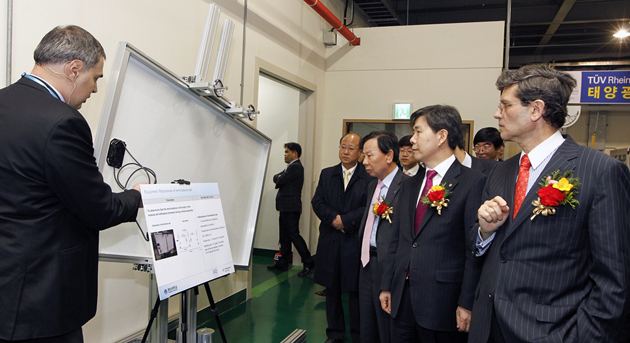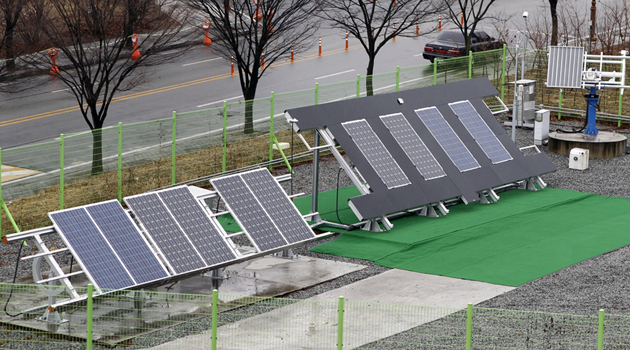World's 7th 'TUV Rheinland Photovoltaic Testing Center', 2nd in world for university
Radically reduce time and cost for international certification for exports
Acceleration of GIFT plan and Yeungnam University rises as hub for Photovoltaic Industry
[March 8, 2012]

Korea's First and World's 7th TUV Rheinland International PV Certification Center opened at YU.
At 2pm on the 8th, Yeungnam University (president Lee, Hyo-soo) held the opening ceremony of the 'TUV Rheinland Yeungnam University Photovoltaic Testing Center' (hereafter called 'TUV YU Testing Center') with the attendance of guests such as German ambassador to Korea Hans-Ulrich Seidt, Chief International Officer of TUV Rheinland Stephan Schmitt, Chief Regional Officer Asia Pacific Michael Jungnitsch, CEO of the TUV Rheinland Korea Stefan Heuer, president of the Korean-German Chamber of Commerce and Industry Friedrich Stockinger, Lieutenant Governor for Political Affairs of Gyeongsangbuk-do Lee, In-seon, and other figures in related institutions and photovoltaic industries. It is now in full operation.
TUV Rheinland is a global safety inspection and certification institute based in Germany. In terms of photovoltaic certification, it is the world's top institute, having an 80% share of the global market. It is continuously development cooperation and support with the International Electrotechnical Commission (IEC) and is acting as a leader in standardizing technology in photovoltaic sector. It is also operating international certification and testing centers for photovoltaic modules in 6 places throughout the world such as in Yokohama in Japan, Cologne in Germany, Arizona in USA, Shanghai in China, Taiwan, and Bangalore in India. The YU Testing Center is only the second to be held in a university following that of Arizona State University in the US.

The German ambassador to Korea (5th from left), president of the Korean-German Chamber of Commerce and Industry (2nd from right), and Chief International Officer of TUV Rheinland (3rd from right) visited Yeungnam University to congratulate the opening of the 'TUV YU Testing Center'.
Prior to the opening ceremony, the Ambassador Seidt stated, "YU is located in a very geographically important location that connects Gumi, Daegu and Pohang, and thus it is very suitable for establishing a Science Cluster." He also added, "Today will be the start of not only cooperation between Korean and Germany companies, but also between universities, and furthermore, it will also promote global industry-academic-research collaboration. Ten years later, we will remember this day."
Chief International Officer of TUV Rheinland Schmitt also explained, "This is the second time that TUV Rheinland worked with a university to establish a Testing Center since doing so with Arizona State University in the US in 2008." He also said, "Yeungnam University has procured world-class research capacities and personnel in the Green Energy, and especially in photovoltaic sector. We expect that with the new testing center, it will be even more active than Arizona State University."
Professor Jeon, Chan-wook (School of Chemical Engineering) was appointed as the director of the Testing Center. Professor Jeon, who is one of the top experts in the compound thin film solar cells sector in Korea, served as the vice-director of the Daekyeong Regional Innovation Center for Solar Cell & Module and the head of Equipment Support Team since 2008. He will construct and operate the TUV YU Testing Center utilizing his experience in conducting photovoltaic-related process/evaluation equipment construction and corporate support activities.

Guests visiting inside the 'TUV YU Testing Center' (from far right, Ambassador Seidt, YU President Lee, Hyo-soo)
With the opening of the Testing Center, it is expected that YU will emerge as the Korean hub for the photovoltaic industry. This is because all exports must pass the TUV YU Testing Center to receive international certification. Currently, the photovoltaic industry is growing in not only Germany, but the entire world. According to the German Federal Association for Renewable Energies, the worldwide transactions in the photovoltaic industry will grow to 6 billion euros by 2020, eight times that of the amount in 2005. In Korea, Woongjin Group recently announced that it would sell its cash-crow, Woongjin Coway so that it could enter the photovoltaic business, Likewise, there is growing interest in the photovoltaic industry, which will serve as a blue ocean in the future, and many large companies are joining the race. Regionally, photovoltaic-related companies are being pursued and there are many policies that are strongly supporting this industry such as the establishment of the East Sea Energy Cluster.
On this, Director Jeon, Chan-wook said, "International certification is absolutely necessary for exports of Korean-made photovoltaic modules. In the past, it was sent to Japan, Shanghai or Taiwan, costing millions to hundreds of millions of won and several months to up to two years to receive such certification. This translates into the possibility that new products, which required massive investments, can become out of date after receiving certification. However, from now on, international certification can be received from YU so this is no longer a concern." He added with emphasis, "At this point of time when export industrialization in the new renewable energy sector is desperately needed as a new growth engine for the Republic of Korea, YU will compete and cooperate with the world as the Korean base for Green Innovation."

Comprehensive Durability Test Equipment for Photovoltaic Modules
Meanwhile, with the opening of the Testing Center, YU's 'GIFT Plan' is expected to become even stronger. GIFT(Green Innovation For Tomorrow) Plan embodies YU's research specialization strategy of 'becoming a university that prepares a 'gift' for the future society through green innovation'. There are three main points in the university specialization strategy in the 'green R&D' sector. They are ▲developing energy conservation technologies in existing industries (LED-IT Fusion Technology Research Center, Center for Green Car Parts) ▲development and commercialization of green energy new technologies (RIC for Solar Cell & Module, Institute of Solar Energy, TUV Rheinland Photovoltaic Testing Center, construction of Korean mass production line for ISET Solar Cells) ▲spreading culture for conserving energy (Human Resources Development Agency). These have been pursued since 2009. Furthermore, the 'CRC' (Convergence Research Cluster), which will be a focal point for fusion and convergence research, was constructed and as its first tenant institute, the Green Energy Building was completed in May of last year. Currently, research on finding new advanced technologies through fusion and convergence of relevant majors and institutes are being conducted. In November 2010, the GGECN (Global Green Energy Cluster Network), which pledges R&D collaboration in the green energy sector with solar energy hub research institutes of the US, Germany, France and Australia. In February 2011, the ISET (International Solar Electric Technology) of the US was attracted to establish a solar cell mass production line in Korea, bringing in investments of 50 million dollars (equivalent to 55 billion Korean won). Through this, YU is aiming to become the world's top 10 in the green energy research sector within the next 10 years.
On this, YU president Lee, Hyo-soo said, "Advanced countries in the photovoltaic sector such as the US, Germany, France and Australia are keeping an eye on Yeungnam University," emphasizing, "Through the Green Glocal Initiative, we will procure global competitiveness for not only YU, but for our region and Korea."













